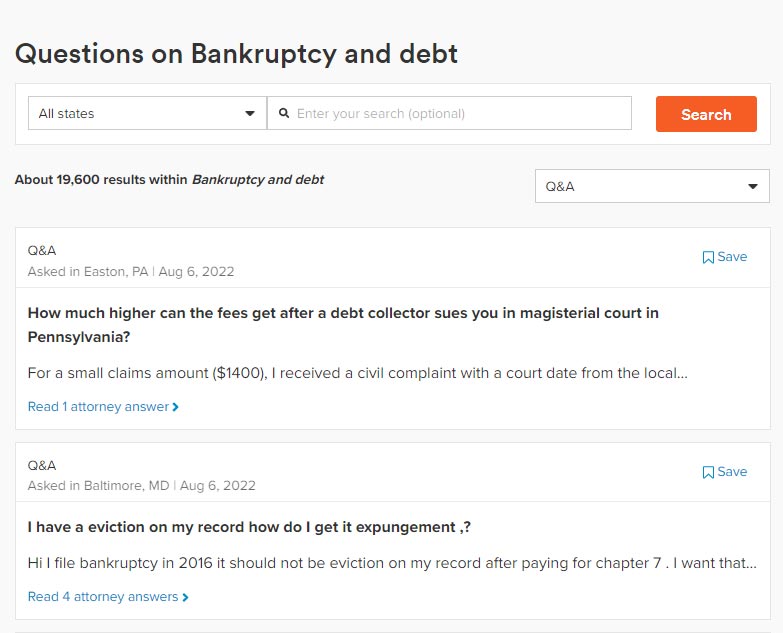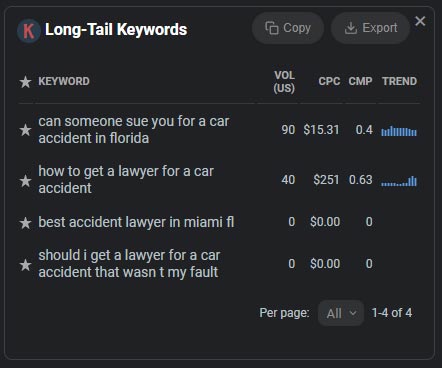
In the digital marketing world, you often hear a lot of talk about keywords.
Some people go as far as ascribing magical powers to keywords as the cure-all for all the woes you might be experiencing whilst trying to market your legal practice online to find those elusive clients.
While keywords are not the only piece of the puzzle that you must have a good grasp of as you plan your marketing strategy, they are important. But what exactly are they and why should you care?
What are keywords?
When you’re trying to get your law firm found easily by prospective clients on search engines like Google and Bing, keywords are the specific words, terms, or phrases that the search engines use to match your web pages to their search users.
This matching is done to produce results for the organic search engine results pages (SERPs). Inclusion in the SERPs is typically the result of an effective search engine optimization (SEO) strategy.
A similar matching is also performed for paid digital advertisement placements, AKA search engine marketing (SEM), campaigns on those search engines.
These keywords are typed into the search engines by users looking for specific information.

Users search for lawyers using keywords on a search engine
For organic search results, if your law practice’s web pages are optimized with great content that’s relevant to those keywords – in addition to other important criteria that search engines use to determine the pages to rank on their SERPs – you are more likely to be matched with a user who conducted a search.
For paid advertising on the search engines, you need to place advertising bids on those keywords and pay to get matched with users searching for those terms.
Some examples of keywords and phrases that a search user could type into the search box are: “business attorney near me”, “Car accident lawyer in Miami”, “Employment lawyer in NYC”, etc.
Why Keyword Research is Important
Keyword research involves all the activities and processes you will employ to make sure that you’re working with the right keywords for your digital marketing activities.
While keywords are not the only important ingredient required for successful digital marketing campaigns – whether SEO or SEM – they are a critical foundation.
They are the basis for the content you will create for your web pages, and what you will be bidding on for your digital ads.
That’s why it’s important to pick the right keywords to focus your content creation efforts, and to attach your advertising dollars to.
To do that successfully, you need to make effective keyword research your starting point.
How to Conduct Keyword Research and Build a Keywords List
To successfully conduct keyword research for your law practice, you must let go of any assumptions you have about the keywords that you think your target audience is using to find legal services providers like yourself.
This is important because many lawyers – and most business owners in general – often have the wrong ideas about the keywords that they believe their audience will use to search for them.
These ideas are often informed by internal industry terminologies and jargon which are usually very different from how your target audience is conducting searches in reality.
Instead, let the data and the objective processes outlined below, guide your steps.
Find Out Your Law firm’s Real Versus Assumed Keywords
As you begin to brainstorm keywords for your list and marketing efforts you want to find out the prime keywords that you should be focusing on. To do this, you must first clearly identify your real audience.
For most lawyers and law firms, the target audience would be everyday individuals who need legal help. These are your prospective clients.
Now and then, other lawyers may visit your website and refer business to you, or even avail themselves of your services, but they are not your primary audience.
Therefore, it’s important to remember that your primary audience is not immersed in legal jargon and that the way they may think of you, and search for lawyers like you, might not necessarily be the way that you and your legal peers would think of, or search for, yourselves.
An example is of a lawyer who practices in the area of Family Law. Her primary focus with her practice is divorce law. If she focuses on the keywords “Family Law”, “Family Law Practice”, “Matrimonial Attorney”, which are all technically the areas of law she practices, she will almost completely miss out on searches by her target audience.
The current data shows that the vast majority of searches for those services in her practice area are with the keywords “Divorce Lawyer”.
Take Surveys and Polls of Your Clients
Taking regular surveys and polls of clients that come to you can reveal patterns that could help with your keyword research processes.
Ask clients how they found you if they came through your website. Get to know if they found you from a search or if your website was recommended to them by someone else.
If they found you via search, ask them what search terms they used. This could be instructive in identifying the terms you are ranking for and will also let you know how others describe you.
Browse the Top Legal Portal Sites
Potential clients are asking lots of questions on many platforms and properties online. Top legal portal sites like Findlaw, Avvo and Justia can be a great source of keywords.
Visit any of those sites and check out the FAQ or Questions and Answers sections of those portals and you will find real questions that your audience is asking.

Legal questions asked by real individuals who need legal help on legal portal sites
Most of the questions will be specific, longer form keywords (AKA “Long tail keywords”, discussed later in this post), but they will provide valuable clues about the legal concerns of your audience.
Research Your Top competitors’ keywords
Imitation is said to be the sincerest form of flattery – so go ahead and check out the keywords that are driving traffic to the websites of the dominant players in your practice area and markets.
If you find keywords that are also relevant to your practice, you can adopt them and work on ranking for them.
Targeting Brand keywords of a Competitor in Your Digital Advertising Campaigns
There might be a dominant player in your space with a lot of name recognition.
This could be a result of long-term, heavy investment in media advertising like radio, TV, billboards, etc.
While you don’t want to optimize your content based on another brand, you could bid on keywords related to their brand and possibly get some rub-off exposure to your own brand as a result.
Use Keyword Research Tools
There is a plethora of tools that can be used for keyword research. Some are free to use while others are paid utilities.
At the bottom of this section is a list of tools that can be used for keyword research.
The ways to conduct keyword research with each one of these tools varies greatly. Consulting the relevant documentation for any particular product is a good starting point.
However, some of the important information you should be obtaining from these tools includes the most important keywords for your practice area and local market, volume of searches for those keywords and phrases, who is ranking for those keywords, and where you currently rank for those keywords.

keyword research tool showing results of a keyword analysis
It is often necessary to use a combination of tools to get the full picture of where you stand and where you want to go with the keywords you discover.
A Word of Caution with Your Analytics and Search Console Traffic Data
When you use tools like Google Webmaster Search Console, for example, you might see some keywords that you rank for or that are driving traffic to your website.
Scrutinize the results carefully to be sure that those keywords are actually relevant to the content you’re providing and for which you’re optimizing your website.
If you’re getting hits for content you don’t provide, it means your visitors will be abandoning your site quickly after a visit – what’s known as a bounce – which can hurt your SEO efforts. If that is the case, explore your content carefully to be sure you’re not inadvertently optimizing for irrelevant keywords.
Keyword Research Tools
- Keywords Everywhere
- Google Keywords Planner
- Google Trends
- Semrush
- Moz
- UberSuggest
- Google Search Console
Understanding Search User Intent and How It Relates to Your Ideal Keywords
When users search for information online their motivation and goals vary.
Some might be looking for general information about a topic for research purposes, while others might be actively searching for a legal services provider to help with an immediate need they have.
The motivation behind a user’s search activity is known as the User Intent.
The keywords users employ in their searches can reveal their intent. Knowing this can help you as you produce your content.
Search intent is grouped into four main categories: informational, navigational, commercial, and transactional.
Informational intent, as the name suggests, denotes that the user’s primary goal is information. An example could be a search like, “How much does an IP attorney make?”
Navigational search intent suggests the user is trying to get directions of some kind. Example: ” website of Jacoby and Lipchinsky PLC”.
Commercial search intent suggests that a product or service evaluation or brand comparison might be taking place. An example could be, “Best employment attorney in Miami”.
Transactional intent suggests a transaction might be imminent. Example: “Car accident lawyer near me”.
As you plan your content creation strategies, you will typically need to create content that satisfies your audience’s intent and falls into all four categories to be successful with your digital marketing efforts.
Every intent type provides an opportunity to acquire a client or promote your thought leadership and expertise.
The Keywords You Currently Rank for and What They Mean
When you start to use keyword research tools like Google’s Webmaster Search Console, you may discover that you’re ranking for some keywords that, while not bad, are not optimal.
As an example, you might find yourself ranking for keywords associated with your firm’s name or the names of individual attorneys or staff at your practice.
That is not a bad thing in itself, but if those are the only major keywords your firm is ranking for, it means that you’re only getting found on the search engines by people who already know of you and are trying to find your website.
It would suggest that the intent of those search users was navigational. It also means that you’re not bringing anybody new into the fold.
Your practice will never grow if only the same people who have already been exposed to you are the same ones who are finding you on the search engines.
What you want happening is for people who have never heard of your firm, but who have a need that your law practice can service, finding you on the search engines, using their search terms.
For that to happen, you must be ranking for keywords that relate to the services you can provide, rather than just your business name.
For example, if you’re a New York City divorce attorney, you want to be ranking well for “NYC divorce lawyer”, not only “Sullivan Family Law PLLC”.
Primary keywords and Long Tail Keywords
After you’ve gone through the process of identifying the primary keywords that you’d like to rank for, it is often advantageous to target another set of keywords known as long tail keywords.
Long tail keywords are related to your primary keywords but are more specific in nature and are usually longer phrases or word groupings.

Long tail keywords associated with primary search keywords
Their search value is often diminished because they may not have a high volume of associated search activity, or the user-intent they suggest might not be directly relevant to the kinds of search intent you primarily want.
However, they will often be easier to rank for than the primary keywords you are targeting, and they will usually convert better because of how specific they are. You can view them as low hanging fruit that could yield some positive returns.
An example of a long tail keyword for a Personal Injury lawyer might be, “How do I know If My Car Accident Case Is Worth Anything?”
How to Use Your Keywords Lists
Mapping Keywords to Your Content
Once you’ve assembled your keywords lists, you need to plan how you’ll use them to create your content or bid on them for your digital advertising campaigns.
For your content and search engine optimization needs you should create content that’s focused on one keyword per page or section of your website.
The reason why is that search engines do not return an entire website in their search results pages. They return a single page at a time.
The page they return is the page that most closely matches what the search user was looking for and the search intent of that user. Therefore, you need to make sure that you’re optimizing each page for one keyword at a time.
If, for example, you have the following keywords in your list: “Personal Injury attorney NYC”, “Car accident lawyer”, “What should I do if I’ve been in a car accident?”, “Medical malpractice lawyer”, each of those keywords should have their own dedicated pages or sections of your website, with unique content that’s directly related to just those keywords.
When you introduce the keywords into your content, be careful not to load your content repeatedly with the keywords and phrases. This is called “keyword stuffing” and is frowned upon by the search engines and attracts penalties.
Instead, focus on answering the questions that your audience has about those keywords as authoritatively and comprehensively as possible. Then you can use them judiciously in specific places like your content headings, as well as important page metatags like the page meta title which the search engines use to decipher what your page is about.
Using Your Keywords in Your Digital Advertising Campaigns
For your digital advertising campaigns, you’re going to be bidding on individual keywords or keyword groups, dependent on the type of ad campaign you’re running.
There is an art and science to bidding on keywords, but you must first evaluate what your primary goals are. Do you just want to drive traffic to your website, or do you want to acquire clients?
If the former is the case, you could bid equally on informational and commercial keywords, as well as transactional keywords.
However, if conversion and client acquisition is the goal, then you’d need to be more aggressive with your bids on transactional keywords, while spending less on informational and commercial intent-driven keywords.
Every firm’s needs and goals will be different so a strategy that is uniquely tailored to your practice will be important.
Summary
Keywords are an important foundation of many of your digital marketing activities.
Use a deliberate, data-driven process to discover the optimal keywords for your legal practice.
Use your prime keywords appropriately in your content development and marketing efforts, as well as in your digital advertising campaigns.